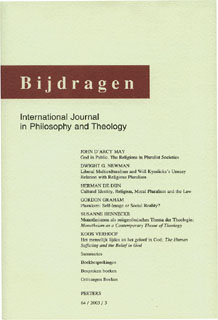 previous article in this issue previous article in this issue | next article in this issue  |

|
Document Details : Title: On the Definition of Religion in Hobbes' Leviathan Author(s): CHEN, Jianhong Journal: Bijdragen Volume: 67 Issue: 2 Date: 2006 Pages: 180-194 DOI: 10.2143/BIJ.67.2.2014262 Abstract : On the Definition of Religion in Hobbes’ Leviathan It has long been a controversial topic whether Hobbes was an atheistic philosopher or a sincere Christian. A clear understanding of the issue requires an investigation into Hobbes’ view of religion. This paper tends to provide such an examination. First, it analyses the legal point of view by which Hobbes distinguishes religion from superstition. Secondly, it examines the two elements by which Hobbes defines religion: fear and power. Thirdly, it explores what true religion is for Hobbes. Fourthly, after dealing with Hobbes’ rational theology, it raises certain questions about difficulties and contradictions in Hobbes’ definition of religion and true religion. Fifthly and finally, drawing on the double teaching theory and taking the purpose of Hobbes’ political theory into account, it concludes that there is a double doctrine in Hobbes on the one hand and, on the other hand, Hobbes desires to publicize the esoteric philosophic teaching in accordance with the purpose of his political philosophy, i.e. with the pursuit of a rational and free world state. |
